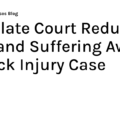Jurisdiction: United States District Court for the Southern District of Florida
Plaintiff Douglas S. Johnson, one of the surviving children and personal representative of the estate of decedent French E. Johnson, filed an amended complaint against 50 defendants, including The Dow Chemical Company. The amended complaint alleged that decedent developed mesothelioma due to his exposure to asbestos while serving in the United States Navy, during his employment with NASA at the Kennedy Space Center, and in connection with non-occupational automotive maintenance and repairs.
In response to the amended complaint, Dow filed a renewed motion to dismiss arguing that “the negligent misrepresentation claim is not pled with the requisite level of specificity and the allegations against the defendants are improperly commingled.”
A complaint must include “a short and plain statement of the claim showing the [plaintiff] is entitled to relief.” Fed. R. Civ. P. 8(a). Rule 8(a) does not necessitate “detailed factual allegations,” however, it does require “more than labels and conclusions, and a formulaic recitation of the elements of a cause of action.” Bell Atl. Corp. v. Twombly, 550 U.S. 544, 555 (2007). In the case of fraud or mistake, a pleading “must state with particularity the circumstances constituting fraud or mistake.” Fed. R. Civ. P. 9(b). However, “[m]alice, intent, knowledge, and other conditions of a person’s mind may be alleged generally.” Id. Rule 9(b) may be “applied less stringently” where an “alleged fraud occurred over an extended period of time and the acts were numerous.” MeterLogic, Inc. v. Copier Sols., Inc., 126 F. Supp. 2d 1346, 1360 (S.D. Fla. 2000). There, a plaintiff must allege “some examples of actual false claims to lay a complete foundation for the rest of [the] allegations.” U.S. ex rel. Clausen v. Lab’y Corp. of Am., 290 F.3d 1301, 1314 (11th Cir. 2002).
In response to Dow’s argument regarding the negligent misrepresentation claim, plaintiff contends that he did not allege a negligent misrepresentation cause of action but rather “a general negligence claim that includes, among other negligent conduct, alleged misrepresentations.” As such, Rule 9(b) does not apply.
The court found that the general negligence claim was predicated, in part, on alleged negligent misrepresentations and concealment. The court further found that plaintiff failed to satisfy the specificity requirements of Rule 9(b). Rather, the allegations referred “generally to conduct of all defendants generally, without any specificity as to which defendants engaged in exactly what conduct.” Because plaintiff did not provide any allegations “tying Dow to any statements or misrepresentations[,]” the court dismissed plaintiff’s negligence claim against Dow insofar as it was based on negligent misrepresentations.
Dow also claimed that the amended complaint asserted “multiple claims against multiple Defendants without specifying which of the Defendants is responsible for which acts or omissions.” A “shotgun pleading” is a Complaint that violates either Federal Rule of Civil Procedure 8(a)(2), defined above, or Rule 10(b). Rule 10(b) requires a party to “state its claims or defenses in numbered paragraphs, each limited as far as practicable to a single set of circumstances.”
While acknowledging that plaintiff intended to generally assert all counts against all defendants (other than Bennet Auto Supply, Inc. in Count II), the court found that Dow was not provided fair notice of the specific allegations being asserted against it.
Accordingly, the court granted Dow’s renewed motion to dismiss the amended complaint. The court dismissed the amended complaint without prejudice and permitted plaintiff to file an amended complaint within 14 days of the court’s order.
Read the full decision here.




